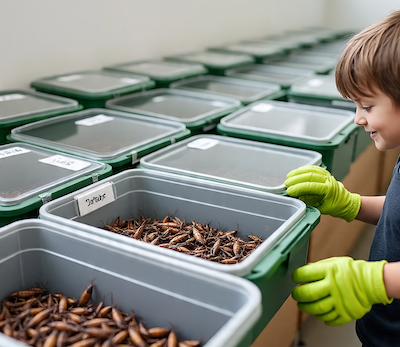Bugs with Benefits — a Glimpse of Wonder entry™ — 1 of 4 —
They even follow us camping. The lantern goes out, you’re zipped up in your sleeping bag, just starting to relax — and then it comes. That inevitable buzz in your ear. You swat at the dark, grumble under your breath, and wonder how something that small can be that annoying. And in the morning? You find out they’ve been eating you. But we’ll get into that in a future entry.
Swatting, spraying, or stomping is often our default response. But maybe — just maybe — we’ve been overlooking some of Jehovah’s most generous workers.
Researchers with the United Nations once published a report on how insects could play a major role in future food security. Not just as something to eat, but as pollinators, recyclers, protein sources, and even waste converters. One expert called them “nature’s solution hiding in plain sight.”
Why would Jehovah choose something so small, so easily ignored, to handle such important work?
 Crickets, for instance, are incredibly efficient at converting food into body mass. They require twelve times less feed than cattle to produce the same amount of protein. They don’t release methane. They don’t need acres of land. And they thrive in small spaces — which makes them an ideal resource in areas where hunger is high and farmland is scarce. That’s why crickets are already being introduced into school lunch programs in parts of Africa and Southeast Asia — not as a novelty, but as a thoughtful, sustainable choice.
Crickets, for instance, are incredibly efficient at converting food into body mass. They require twelve times less feed than cattle to produce the same amount of protein. They don’t release methane. They don’t need acres of land. And they thrive in small spaces — which makes them an ideal resource in areas where hunger is high and farmland is scarce. That’s why crickets are already being introduced into school lunch programs in parts of Africa and Southeast Asia — not as a novelty, but as a thoughtful, sustainable choice.
 But an even more efficient insect — the black soldier fly larva — rarely makes it to our plates. It’s edible, packed with nutrients, and capable of thriving on food scraps that would otherwise be wasted. Yet rather than eat it ourselves, we usually feed it to chickens. In fact, entire insect farms like Protix now exist just to raise black soldier fly larvae for livestock. And yes — that counts as farming. I’ve just never thought of bugs that way. But if raising them on purpose is what qualifies, then maybe those bread crumbs I never cleaned up from the picnic table? Put it on the résumé.
But an even more efficient insect — the black soldier fly larva — rarely makes it to our plates. It’s edible, packed with nutrients, and capable of thriving on food scraps that would otherwise be wasted. Yet rather than eat it ourselves, we usually feed it to chickens. In fact, entire insect farms like Protix now exist just to raise black soldier fly larvae for livestock. And yes — that counts as farming. I’ve just never thought of bugs that way. But if raising them on purpose is what qualifies, then maybe those bread crumbs I never cleaned up from the picnic table? Put it on the résumé.
Why would Jehovah design a creature with so much potential, knowing full well that most people wouldn’t want to look at it — never mind eat it?
Jehovah’s provision comes in all shapes and sizes — sometimes with six legs and a job to do.
Isn’t that just like Jehovah?
Psalm 104 says the earth is “full of your creatures,” and it goes on to describe how Jehovah “provides food for them at the proper time.” He has filled the planet with life — and built into that life a system of giving, growing, and renewing. Bugs aren’t a backup plan. They’re part of the original blueprint.
Some clean our wounds. Some carry pollen. Some break down waste so new life can flourish. And yes — some are even edible. Not as a dare, but as a design.
Could it be that Jehovah wants us to rethink where we look for value? Could the “least” among creatures be the ones preserving life in ways we’ve barely noticed?
It’s humbling to realize that Jehovah embedded provision not just into fields and trees and skies — but into the quiet corners, into the things that creep.
The same buzzing nuisance that kept you up last night might be pollinating your breakfast. The beetle you brushed off your pants might be aerating the soil beneath your garden. Jehovah doesn’t need grand gestures to sustain life — just the quiet faithfulness of creatures doing exactly what they were designed to do.
What if we judged less by what makes us comfortable — and more by what Jehovah made purposeful?
He didn’t just create the big and the beautiful. He gave attention to the tiny, the creeping, the crawling — and built into them benefits we are only beginning to understand. He knew how to care for the whole earth long before we knew how to ruin it.
What else might we be dismissing too quickly?
What parts of creation — or even of ourselves — still carry hidden benefits Jehovah placed there for good?
-
 1
1
-
 3
3

1 Comment
Recommended Comments
Join the conversation with your brothers and sisters!
You are posting as a guest. If you are already a member, sign in now to post with your existing account.
Note: Your post will require moderator approval before it will be visible.